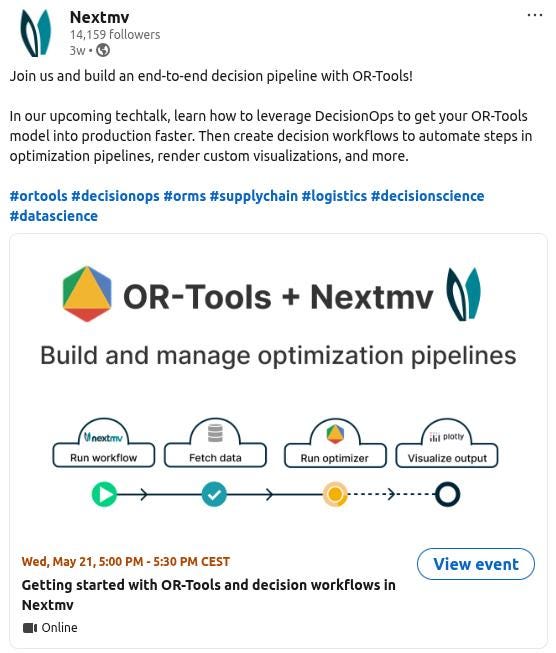📈 Solver selection, Operationalize OR-Tools, and bridging the gap
Local Optimum: short, imperfect-yet-useful ideas - Edition #9
Welcome to a new edition of Local Optimum: a short, imperfect-yet-useful collection of ideas related to optimization, decision-making, and applied Operations Research.
Let’s dive in! 🪂
1) 🧩 Solver selection
Selecting a solver is a central part of the management process of an OR project.
Identifying optimization problems at your company → translate those business problems into mathematical models → design an optimization solution and select the solver that fits the best → deploy the solution → monitoring the impact on business.
That’s why, if you want to start from one point, you need to know the solvers that exist in the market.
Here I give you a LinkedIn post in which many people collaborated to add their ideas.
And if you want a compass 🧭 to guide you in the process of selecting a solver, here I have a few tips.
2) 🚀 Operationalize OR-Tools
One popular open-source solver within that previous list is Google OR-Tools.
It ships with a purpose-built routing module, and that’s quite good since no heavy math modelling is required.
And it’s also battle-tested, earning gold medals in recent Max-SAT competitions.
Want to see it in action? Nextmv is hosting a live session on Wednesday, 21 May, covering:
building a data-fetch-run-visualize workflow with OR-Tools
tips to slot it into your existing stack faster
If you want to know more, click on the picture below!
(this is not a paid collaboration, just genuine interest)
3) 🌉 Bridging the gap
I just read the latest newsletter from HiGHS.
(thanks Javier Berga García for the link!)
It discusses GPU accelerated optimization with PDLP, sharing these insights:
The conclusion is that PDLP can solve some LP problems significantly faster than interior point or simplex, and a few HiGHS users have already reported this, but it’s the exception rather than the rule, and the accuracy of the claimed solution must be assessed.
Frankly, I expected the gains to be broader.
Back in October 2024 I shared my early thoughts on this new solver from Google.
If you want to know the theoretical advances it proposes, read the full piece here:
Beyond Gurobi: 3+ years with Google OR-Tools
Looking at the State of Mathematical Optimization Report from Gurobi, most of the problems fall under planning, operational applications, or logistics.
Many of those problems have lots of binary variables, so you can use a different solver like Google OR-Tools for solving them.
Next Monday, I’ll share my experience using it at planning problems.
I’ll cover:
🏆 Why Google OR-Tools (and not others)
💡 Modeling ideas after more than 3 years using it
📚 Workflows and where to look for good documentation
If you’re about to solve a planning problem and you’re looking for a solver, this will be useful. See you Monday!
And that’s it for today!
If you’re finding this newsletter valuable, consider doing any of these:
1) 📣 Advertise in Feasible. I’m always looking for great products and services that I can recommend to subscribers. If you are interested in reaching an audience of Operations Research Engineers, you may want to advertise here. Just 📨 answer this email 📨 and I’ll get back to you.
2) 📤 Share the newsletter with a friend, and earn rewards in compensation.
If you have any comments or feedback, just respond to this email!
Have a nice day ahead ☀️
Borja.






